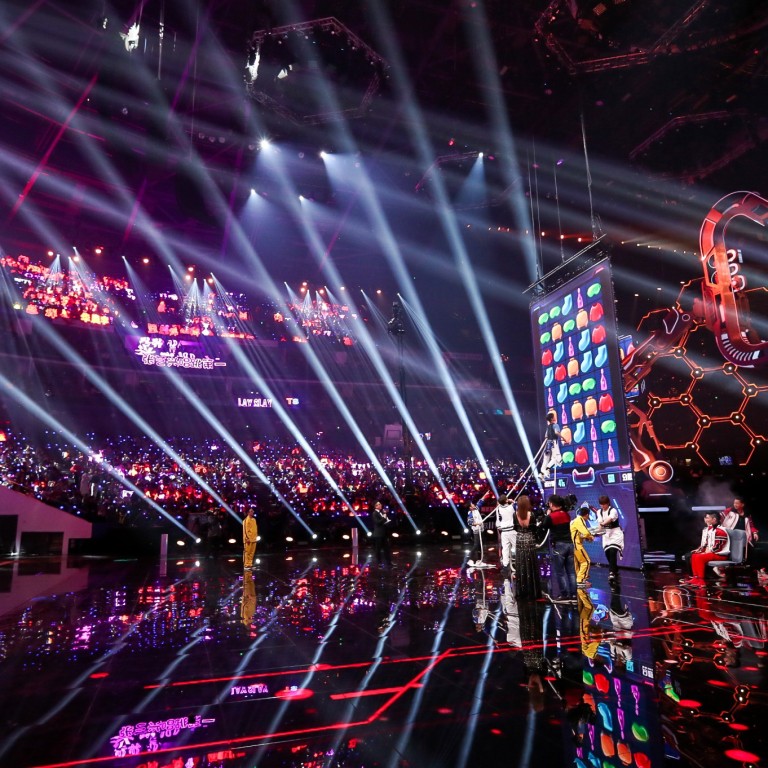
Consumers from China’s smaller cities lift Alibaba to new Singles’ Day record as buyers shrug off trade war
- Alibaba’s Singles’ Day shopping festival, which falls on November 11 every year, is the world’s largest of its kind
Consumers from China’s smaller cities helped lift Alibaba to a new Singles’ Day record of 268.4 billion yuan (US$38.4 billion) in sales, as the 24-hour shopping extravaganza indicated that people are still keen to spend if they find a bargain.
The final tally for this year's Singles' Day compared with gross merchandise volume (GMV) of 213.5 billion yuan last year, an increase of almost 26 per cent compared with 27 per cent the year before, as buyers shrugged off the effects of a months-long US-China trade war and a wider slowing in China’s economy.
Alibaba said that Juhuasuan, its e-commerce platform that targets tier-3 cities and below, had 7,000 items that hit over a million orders and 576 items that received over 10 million orders.
“This result shows the continued ability of e-commerce giants to generate and capture demand online,” said Michael Norris, a strategy manager with management consultancy AgencyChina. “One of the stand-outs this year was live-stream, taking consumers from product discovery to purchase within a few clicks.”
Alibaba’s Singles’ Day shopping festival, which falls on November 11 every year, is the world’s largest of its kind, where shoppers scoop up everything from consumer electronics to luxury items and even cars.
Consumers in China’s lower-tier cities, such as Guilin, Luoyang and Sanya, have showed a higher “willingness to pay” when compared with those in more affluent cities like Xiamen and Zhuhai, as people in smaller Chinese cities increasingly seek an upgrade in their quality of life and experience, according to PwC’s Global Consumer Insights Survey 2019 China Report issued ahead of this year’s event.
While Alibaba’s e-commerce marketplaces Tmall and Taobao are traditionally the mainstays of the annual shopping extravaganza, this year’s festival included business-to-business e-commerce platforms like AliExpress as well as Lazada, Alibaba’s Southeast Asian e-commerce subsidiary, as the company taps international consumers.
Alibaba Group Holding is China’s largest e-commerce operator and the parent company of the South China Morning Post.
China’s e-commerce waste could quadruple by 2025, green groups say
“The digital consumption among Chinese consumers is still very high,” said Benson Ng, EY Greater China digital advisory leader, adding that the demand for imported goods in the country is still strong despite the US-China trade war.
“The origin of the [imported] goods sold in China come from Japan and the US, and this is very good news.”
Opening sales were brisk, hitting US$10 billion in just under 30 minutes, half the time from the previous year.
GMV for the Double 11 Global Shopping Festival is the total value of orders settled through Alipay on Alibaba’s consumer-facing core commerce platforms, as well as Lazada and AliExpress, within a 24-hour period on November 11. It is reported on a real-time basis and includes shipping charges paid, according to Alibaba.
Apart from Alibaba, rival sites such as JD.com and Pinduoduo have also launched their own Singles’ Day campaigns, to entice buyers to spend on their platforms.
Singles’ Day got its name from its date. Written numerically as 11/11, the date looks like “bare branches”, a Chinese expression for the single and unattached. As a kind of antidote to the societal pressures of being in a relationship, many of China’s singles began splurging on themselves on Singles’ Day, which became seen as a type of anti-Valentine’s Day.
The Hong Kong protesters giving Singles’ Day a miss
Alibaba held its first Singles’ Day shopping event in 2009 as a promotional campaign, but these days it has morphed into a show of China’s collective consumer spending power. Last year, consumers spent 4,000 times more than they did during the first ever Singles’ Day event.
Ahead of this year’s shopping extravaganza, consumers seemed to be as eager as ever to snap up deals. Prior to the beginning of the festival on Monday, 64 brands, including Apple, Dyson, Lancome and L’Oreal, had already achieved 100 million yuan in pre-orders, Alibaba said.
Alibaba quarterly revenue jumps 40 per cent ahead of Singles’ Day
Cainiao, Alibaba’s logistics affiliate, had an inventory of 500 million tons of goods, ready to be dispatched to consumers shopping on Singles’ Day. On this day each year, Alibaba pushes its technology and services, such as its cloud computing systems, to the limit.
Singles’ Day has also evolved from a day of massive sales to one that merges both consumption and entertainment. Each year, Alibaba holds a massive concert the day before Singles’ Day, inviting international superstars such as Mariah Carey and acts like Cirque du Soleil to perform in front of thousands, while live-streaming the concert to millions of viewers across the country.
This year’s concert featured Taylor Swift, just months after performing at a similar Prime Day concert for Amazon in the US, as well as Chinese pop stars such as G.E.M. and TFBoys’ Jackson Yee.
For more insights into China tech, sign up for our tech newsletters, subscribe to our Inside China Tech podcast, and download the comprehensive 2019 China Internet Report. Also roam China Tech City, an award-winning interactive digital map at our sister site Abacus.

